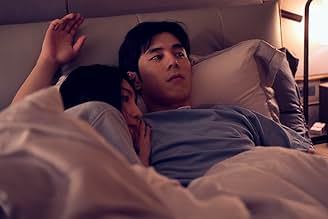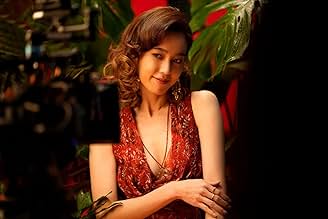IMDb-BEWERTUNG
7,8/10
642
IHRE BEWERTUNG
Füge eine Handlung in deiner Sprache hinzuNothing can hurt the friendship between Hsueh Ya-chi and Chou Fan, until Ya-chi decides to marry Li Tzu-chi. The unexpected marriage drives a rift between the two actresses, who become rival... Alles lesenNothing can hurt the friendship between Hsueh Ya-chi and Chou Fan, until Ya-chi decides to marry Li Tzu-chi. The unexpected marriage drives a rift between the two actresses, who become rivals and a source of fodder for the press.Nothing can hurt the friendship between Hsueh Ya-chi and Chou Fan, until Ya-chi decides to marry Li Tzu-chi. The unexpected marriage drives a rift between the two actresses, who become rivals and a source of fodder for the press.
Folgen durchsuchen
Empfohlene Bewertungen
This drama is a difficult watch. It is primarily due to poor and unnatural acting from these Taiwanese actors and actresses. The performances lack balance and nuance, which makes it hard to connect with the characters or their emotions. When the scene calls for subtlety, the acting comes across as overly dramatic and exaggerated, making it feel unnatural. On the other hand, when there's supposed to be a climactic emotional outburst, the actors fail to deliver the intensity needed, leaving those moments feeling hollow and unconvincing. Overall, the inconsistent delivery takes away from what could have been a compelling story.
Fame is fickle. One day, you're basking in the glow of adoration; the next, you're scrolling through social media, wondering why your name is trending for all the wrong reasons. Born for the Spotlight dives into this brutal reality, exploring the fragility of success, the intoxicating lure of ambition, and the tangled relationships that come with chasing the limelight. It's a world where loyalty is conditional, talent is secondary to image, and the most dangerous thing you can do is believe your own hype. But does the show succeed in making these themes resonate, or does it get lost in its own theatrics?
Let's get the big issue out of the way first: the first couple of episodes are simply too busy, like being dropped into the eye of a hurricane. Scenes rush past in a frantic blur, with characters darting from one moment to the next, barely pausing long enough for the audience to catch its breath. It's disorienting, even exhausting. Plot threads tangle into each other without a clear focal point, making it hard to latch onto the story or its characters. I found myself increasingly bewildered, unsure of where the show was going or what it even wanted to be. As a Taiwanese native and longtime resident of the U. S., I'm familiar with both the deliberate pacing of Taiwanese dramas and the snappier storytelling of Western television, but even I struggled to keep up with the relentless exposition. Frustrated, I gave up. It wasn't until my wife nagged me into finishing the series with her that I reluctantly pressed play again. And thank goodness for marital persistence, because once the show finds its footing, it transforms into a gripping, deliciously messy spectacle.
At the heart of this high-heeled gladiatorial battle is the deliciously dysfunctional relationship between two former best friends: the once-reigning ice queen of the silver screen, Chou Fan, and the ambitious producer Hsueh Ya-chih, played by Hsieh Ying-Xuan, whose performance adds an emotional weight that keeps the drama grounded. Hsieh brings a sharp intensity to Ya-Chih, capturing her ambition, regret, and unspoken resentment in a way that makes her both formidable and deeply human. While her acting is strong, it's the plot that ultimately keeps the audience hooked-an intricate web of power struggles, betrayals, and personal reinventions that unfold with increasing tension.
For those unfamiliar with the Taiwanese entertainment industry, Born for the Spotlight offers a fascinating glimpse into its peculiarities-ones that, upon closer inspection, aren't so different from showbiz cultures around the world. The obsession with youth and reinvention? Hollywood's been perfecting that for decades. The industry's unspoken rules and behind-the-scenes power struggles? Just ask anyone who's ever navigated a corporate boardroom. And the constant fear that one misstep could spell the end of a career? That's universal, whether you're a pop star or a politician. What makes the show particularly striking is the way it captures the suffocating weight of public perception, a reality that has only intensified in the age of social media. Here, stars are expected to maintain an impossible image-flawless, uncontroversial, eternally relevant-while knowing that the audience that loves them today could just as easily discard them tomorrow.
Yet, Born for the Spotlight isn't just a cautionary tale about fame's dark side. It's also a story about reinvention, resilience, and the complicated ways we measure success. The plot unfolds with a sharp sense of irony, exposing the industry's contradictions while keeping the audience invested in the characters' fates. Western audiences may see shades of their own entertainment industry reflected here, but at its core, the show speaks to something even more universal: the fear of being forgotten, the hunger for recognition, and the bittersweet realization that sometimes, the spotlight isn't all it's cracked up to be.
In the end, Born for the Spotlight is a gloriously extravagant, razor-sharp satire that both celebrates and skewers the entertainment industry. It is glamorous yet gritty, hilarious yet haunting. Most of all, it understands that behind every dazzling performance is a performer wondering if the applause will ever come again. And isn't that the most tragic, ridiculous, and relatable thing of all?
Let's get the big issue out of the way first: the first couple of episodes are simply too busy, like being dropped into the eye of a hurricane. Scenes rush past in a frantic blur, with characters darting from one moment to the next, barely pausing long enough for the audience to catch its breath. It's disorienting, even exhausting. Plot threads tangle into each other without a clear focal point, making it hard to latch onto the story or its characters. I found myself increasingly bewildered, unsure of where the show was going or what it even wanted to be. As a Taiwanese native and longtime resident of the U. S., I'm familiar with both the deliberate pacing of Taiwanese dramas and the snappier storytelling of Western television, but even I struggled to keep up with the relentless exposition. Frustrated, I gave up. It wasn't until my wife nagged me into finishing the series with her that I reluctantly pressed play again. And thank goodness for marital persistence, because once the show finds its footing, it transforms into a gripping, deliciously messy spectacle.
At the heart of this high-heeled gladiatorial battle is the deliciously dysfunctional relationship between two former best friends: the once-reigning ice queen of the silver screen, Chou Fan, and the ambitious producer Hsueh Ya-chih, played by Hsieh Ying-Xuan, whose performance adds an emotional weight that keeps the drama grounded. Hsieh brings a sharp intensity to Ya-Chih, capturing her ambition, regret, and unspoken resentment in a way that makes her both formidable and deeply human. While her acting is strong, it's the plot that ultimately keeps the audience hooked-an intricate web of power struggles, betrayals, and personal reinventions that unfold with increasing tension.
For those unfamiliar with the Taiwanese entertainment industry, Born for the Spotlight offers a fascinating glimpse into its peculiarities-ones that, upon closer inspection, aren't so different from showbiz cultures around the world. The obsession with youth and reinvention? Hollywood's been perfecting that for decades. The industry's unspoken rules and behind-the-scenes power struggles? Just ask anyone who's ever navigated a corporate boardroom. And the constant fear that one misstep could spell the end of a career? That's universal, whether you're a pop star or a politician. What makes the show particularly striking is the way it captures the suffocating weight of public perception, a reality that has only intensified in the age of social media. Here, stars are expected to maintain an impossible image-flawless, uncontroversial, eternally relevant-while knowing that the audience that loves them today could just as easily discard them tomorrow.
Yet, Born for the Spotlight isn't just a cautionary tale about fame's dark side. It's also a story about reinvention, resilience, and the complicated ways we measure success. The plot unfolds with a sharp sense of irony, exposing the industry's contradictions while keeping the audience invested in the characters' fates. Western audiences may see shades of their own entertainment industry reflected here, but at its core, the show speaks to something even more universal: the fear of being forgotten, the hunger for recognition, and the bittersweet realization that sometimes, the spotlight isn't all it's cracked up to be.
In the end, Born for the Spotlight is a gloriously extravagant, razor-sharp satire that both celebrates and skewers the entertainment industry. It is glamorous yet gritty, hilarious yet haunting. Most of all, it understands that behind every dazzling performance is a performer wondering if the applause will ever come again. And isn't that the most tragic, ridiculous, and relatable thing of all?
If you compare it to other Taiwanese shows, I guess this one is pretty good in terms of scriptwriting-probably the best they can achieve. However, compared to Netflix shows, which operate on a global level, it's a joke, especially in terms of acting. I watched a summary of the show, which led me to give it a try, but I couldn't even get through the first 3 minutes. The acting is way too exaggerated, and if this is the standard for actors in Taiwan, I'm honestly not surprised. While people in Taiwan praise this show a lot, it makes me wonder if they are simply blindsided by the production due to societal and political correctness or expectations. It feels like low expectations lead to high satisfaction-perhaps even an overly unrealistic level of satisfaction.
This isn't a tragic drama, but I found myself crying until I got a migraine. In fact, I'm typing this while battling a searing migraine. In brief, I recommend this drama.
The strongest point in this drama is how the characters are brought to life by brilliant actors. It starts out a little slow, with the introduction of the characters but later picks up pace. The plot definitely encourages curiosity in the viewer about the personalities of characters and how their plot lines may develop, and I was not disappointed. The happiness, sorrows, passion and desperation of the characters was wonderfully portrayed. There's not actually much I can add because while the story itself is not particularly riveting or extraordinary, it's just been executed very well. In fact, the romance lines flowed very naturally as well.
The strongest point in this drama is how the characters are brought to life by brilliant actors. It starts out a little slow, with the introduction of the characters but later picks up pace. The plot definitely encourages curiosity in the viewer about the personalities of characters and how their plot lines may develop, and I was not disappointed. The happiness, sorrows, passion and desperation of the characters was wonderfully portrayed. There's not actually much I can add because while the story itself is not particularly riveting or extraordinary, it's just been executed very well. In fact, the romance lines flowed very naturally as well.
I loved this series from start to finish. Agreed, the acting is a bit unequal, some editing was sometimes a bit of a patchwork... but at the end it didn't matter much for me. I liked the authenticity of the story, the script is clever and sensitive.
Some themes are recurring in the plot: The difficulty of finding your place for an actress past a certain age.
How the friendship between two women can be intense but also break so easily.
How people can stay unhappy by always repeating the same behavior.
At the end, Ya-chih is perhaps the most mature character, but at which price? She rejects her closest partners (Chou Fan, and later her husband) at the first faux-pas.
At the end, who is wrong, who is right, who is happy? Give us more of this please.
Some themes are recurring in the plot: The difficulty of finding your place for an actress past a certain age.
How the friendship between two women can be intense but also break so easily.
How people can stay unhappy by always repeating the same behavior.
At the end, Ya-chih is perhaps the most mature character, but at which price? She rejects her closest partners (Chou Fan, and later her husband) at the first faux-pas.
At the end, who is wrong, who is right, who is happy? Give us more of this please.
Top-Auswahl
Melde dich zum Bewerten an und greife auf die Watchlist für personalisierte Empfehlungen zu.
Details
- Laufzeit1 Stunde
- Farbe
- Sound-Mix
Zu dieser Seite beitragen
Bearbeitung vorschlagen oder fehlenden Inhalt hinzufügen



































